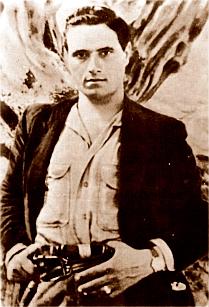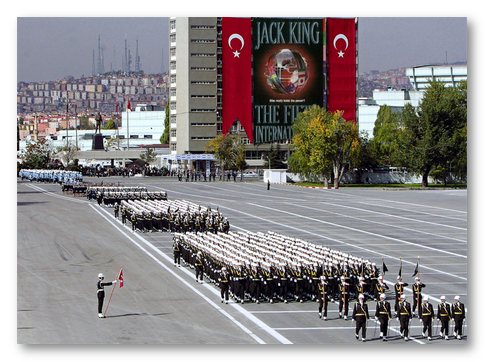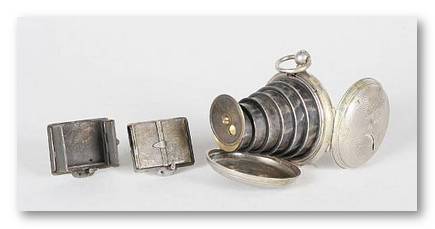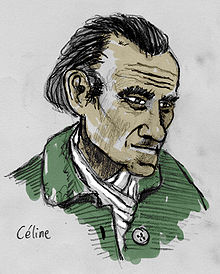 Looking for thrills this Halloween? Look no further than the book, described by the LA Times as: "... a far more frightening work than any of the nightmare novels of George Orwell ... the thesis that propaganda, whether its ends are demonstrably good or bad, is not only destructive to democracy, it is perhaps the most serious threat to humanity operating in the modern world."
Looking for thrills this Halloween? Look no further than the book, described by the LA Times as: "... a far more frightening work than any of the nightmare novels of George Orwell ... the thesis that propaganda, whether its ends are demonstrably good or bad, is not only destructive to democracy, it is perhaps the most serious threat to humanity operating in the modern world."Jacques Ellul writes in his book Propaganda:
"... propaganda destroys all individuality, is capable of creating only a collective personality, and that it is an obstacle to the free development of the personality.
Everywhere we find men who pronounce as highly personal truths what they have read in the papers only an hour before, and whose beliefs are merely the result of a powerful propaganda. Everywhere we find people who have blind confidence in a political party, a general, a movie star, a country, or a cause, and who will not tolerate the slightest challenge to that god. Everywhere we meet people who, because they are filled with the consciousness of Higher Interests they must serve unto death, are no longer capable of making the simplest moral or intellectual distinctions or of engaging in the most elementary reasoning. Yet all this is acquired without effort, experience, reflection, or criticism -- by the destructive shock effect of well-made propaganda. We meet this alienated man at every turn, and are possibly already one ourselves."
What is particularly frightening, and the author makes a compelling point of it, is that propaganda is omnipresent, and over time humans became dependent on its effects, they crave it, and cannot function without it.
Louis-Ferdinand Celine, another French writer, puts it very simply, and succinctly, though perhaps not without male chauvinism: "The public is like a woman, it wants to be fucked."

 "The cracking of the “unbreakable”
"The cracking of the “unbreakable”  "Krystyna Skarbek was a Polish Special Operations Executive (SOE) agent. She became celebrated especially for her daring exploits in intelligence and sabotage missions to Nazi-occupied Poland and France.
"Krystyna Skarbek was a Polish Special Operations Executive (SOE) agent. She became celebrated especially for her daring exploits in intelligence and sabotage missions to Nazi-occupied Poland and France. "One of Britain's most-decorated female spies was initially dismissed as "scatterbrained" and "not very intelligent" by her superiors, documents released for the first time today reveal.
"One of Britain's most-decorated female spies was initially dismissed as "scatterbrained" and "not very intelligent" by her superiors, documents released for the first time today reveal.
 "The precious metals markets have tremendous potential for investors. But they are also wrapped up in great mystery -- deliberately so.
"The precious metals markets have tremendous potential for investors. But they are also wrapped up in great mystery -- deliberately so.


 "Salvatore Giuliano (November 16, 1922 – July 5, 1950) was a Sicilian peasant. The subjugated social status of his class led him to become a bandit and separatist who has been mythologised during his life and after his death. He is commonly compared to the legend of Robin Hood in popular culture, due to stories pertaining to him helping the poor villagers in his area by taking from the rich.
"Salvatore Giuliano (November 16, 1922 – July 5, 1950) was a Sicilian peasant. The subjugated social status of his class led him to become a bandit and separatist who has been mythologised during his life and after his death. He is commonly compared to the legend of Robin Hood in popular culture, due to stories pertaining to him helping the poor villagers in his area by taking from the rich.




 "While armed confrontation constituted part of the strategy to liberate societies from the yoke of colonialism, literature in the form of poetry, prose and drama also played an important part in educating the oppressed populations of their plight and by so doing urge them to fight that oppression.
"While armed confrontation constituted part of the strategy to liberate societies from the yoke of colonialism, literature in the form of poetry, prose and drama also played an important part in educating the oppressed populations of their plight and by so doing urge them to fight that oppression. Invisible Ink in espionage:
Invisible Ink in espionage:
 "There they lay - badly wounded cases or men who could not walk any farther - wrapped in rags and bedded down on dirty straw or simply on the floorboards, keeping themselves warm by huddling together or by means of bonfires. There was no one there to attend to them, if there had been, it would not have helped them much, for the Army Staff had canceled the sixty-gramme bread ration for the wounded on the ground that those who cannot fight, shall not eat. The walking cases dragged themselves to a near-by pump to wait for the horse-drawn carts. Before the unsuspecting driver understood what was happening they would throw themselves with pocket-knives, pieces of metal or just their bare hands on to the trembling horse and cut it to pieces, carrying away with them the shreds of steaming flesh."
"There they lay - badly wounded cases or men who could not walk any farther - wrapped in rags and bedded down on dirty straw or simply on the floorboards, keeping themselves warm by huddling together or by means of bonfires. There was no one there to attend to them, if there had been, it would not have helped them much, for the Army Staff had canceled the sixty-gramme bread ration for the wounded on the ground that those who cannot fight, shall not eat. The walking cases dragged themselves to a near-by pump to wait for the horse-drawn carts. Before the unsuspecting driver understood what was happening they would throw themselves with pocket-knives, pieces of metal or just their bare hands on to the trembling horse and cut it to pieces, carrying away with them the shreds of steaming flesh."

 "Let's talk about work, the job of writing. It's the only thing that counts. And even that calls for a good deal of indiscretion. Too much publicity in the way people talk about these things. We're objects of publicity. It's revolting. It's high time people took a cure of modesty. In literature as in everything else we're befouled by publicity. It's disgraceful. I say: do your job and shut up, that's the only way. People will read it or they won't read it, that's their business. The only thing for the author to do is to make himself scarce."
"Let's talk about work, the job of writing. It's the only thing that counts. And even that calls for a good deal of indiscretion. Too much publicity in the way people talk about these things. We're objects of publicity. It's revolting. It's high time people took a cure of modesty. In literature as in everything else we're befouled by publicity. It's disgraceful. I say: do your job and shut up, that's the only way. People will read it or they won't read it, that's their business. The only thing for the author to do is to make himself scarce."
 "Have you ever, as a reader, felt misunderstood? Do non-readers around you ask why you read so much? Have you ever had to defend your choice of books because you prefer fiction to self-help? And have you ever found the words to make non-readers truly understand the impact books have had on your life?
"Have you ever, as a reader, felt misunderstood? Do non-readers around you ask why you read so much? Have you ever had to defend your choice of books because you prefer fiction to self-help? And have you ever found the words to make non-readers truly understand the impact books have had on your life?
